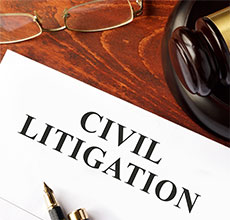Southern Indiana Personal Injury Attorney, Salem
Our approach is different. At Thomas E. Scifres, P.C., we don’t believe in offering cookie-cutter solutions to real legal issues that can have life-altering and long-lasting effects on our clients and their families. Whether you have been injured by the negligence of another, need experienced guidance through the mediation process, or face the loss of a loved one, we seek a deeper understanding of your underlying goals and what you hope to achieve through our representation. This allows us to conduct a more comprehensive, personalized assessment of options for you, our client, as well as help you determine the best course of action to proceed.
From our longer initial consultation, to our flexible fees options, and through all facets of our representation, we seek to partner with our clients and educate them on the finer legal points of their situation in order to empower them to make informed decisions on the dilemmas they face.
What Damages Are Available In Indiana Personal Injury Claims?
Medical expenses play a significant role in the claim, encompassing past and future medical bills required for treating the injuries sustained in the accident. These expenses may include hospitalization, surgeries, medication, physical therapy, and rehabilitation.
The injured party can also seek compensation for lost wages or income during the recovery period, including potential future earning capacity if the injury leads to a long-term disability affecting their ability to work. Individuals who suffer injuries can pursue compensation for non-economic damages as well, which cover aspects such as pain and suffering, emotional distress, and loss of enjoyment of life. These damages aim to address the intangible effects the accident has had on the injured person’s well-being and overall quality of life.
Additionally, if personal property was damaged in the accident, the victim may claim compensation for repair or replacement costs.
Furthermore, in cases of permanent disability or disfigurement, the injured party can seek damages to account for the enduring impact on their life.
Lastly, in certain situations, the injured person’s spouse may be entitled to “loss of consortium” damages, which compensate for the loss of companionship and support resulting from the injury.
What Is The Time Limit To File A Personal Injury Claim In Indiana?
It is crucial to thoroughly understand the statute of limitations for filing a personal injury claim in Indiana. This legal timeframe establishes a strict two-year limit within which an injured individual must initiate a lawsuit against the responsible party. For the majority of personal injury cases, the statute of limitations starts on the date of the accident or injury. It is essential to file your lawsuit within this two-year timeframe; otherwise, the court may dismiss your case, causing you to lose the chance to seek compensation through the legal system.
While the general rule is a two-year timeframe, there may be exceptions depending on the case’s circumstances. For instance, if the injured person was a minor at the time of the accident, the two-year period may be extended until they reach the age of 18. Moreover, in cases of delayed discovery, where the full extent of the injury was not immediately apparent, the statute of limitations might be extended to allow the injured party to file the claim once the injury is discovered or reasonably should have been discovered.
What Should I Do After An Accident?
When facing the aftermath of an accident, it’s essential to take specific actions to protect yourself and your potential personal injury claim in Indiana: Make your health and safety a priority.
- Seek prompt medical attention for both yourself and others involved in the accident, even if the injuries appear minor.
- In the event of a motor vehicle accident, make sure to report it to the police and obtain a copy of the accident report. This report can be valuable for insurance claims and legal matters.
- Collect evidence from the scene, including photos of the accident site, property damage, injuries, and road conditions. Get contact information from witnesses.
- Refrain from admitting fault or discussing specifics with others or insurance representatives until consulting a personal injury attorney.
- Inform your insurance company about the accident, but exercise caution if providing recorded statements without first seeking legal advice.
- Consider seeking assistance from a skilled personal injury lawyer who can assess your case, guide you through the claims process, deal with insurance companies, and protect your rights during legal proceedings.
Request For A Consultation
Personal Injury
Accidents can happen when we least expect them and leave physical and mental scars that require more than a simple bandage to heal. Injury litigation lawyer Thomas E. Scifres helps victims of automobile crashes, cycling collisions, pedestrian accidents, trucking crashes, serious injuries, landowner liability, slip-and-falls, and more recover the compensation they deserve.
Tom as a personal injury attorney has helped countless victims secure the damages they need to move forward with their life after suffering an accident caused by someone else’s negligence. If you’re facing a permanent disability, scarring, or disfiguration because of your accident, it’s critical to have a serious injury lawyer on your side to guide you through the personal injury claims process, aggressively pursue your claim, and deal with the insurance company on your behalf.
For those who had an accident befall them while in a place of business, Tom as slip-and-fall lawyer can help pursue damages from the wrongful party.
And for those family members who’ve suffered the unthinkable, the unexpected loss of their loved one due to a preventable death, Tom as a wrongful death attorney will work to secure just compensation. While no amount of money can bring a lost loved one back, families should at least not have to worry about making ends meet in their absence. Read more
Probate and Guardianship
When it comes to matters such as probate and guardianship, a purely legal approach is simply not enough. As part of our comprehensive approach at Thomas E. Scifres, we develop creative solutions to ease transitions for our clients and their families. Whether clients are entering into probate litigation after the death of a loved one, seeking to establish a guardianship, building their estate plan, or pursuing other matters, we strive to provide experienced and knowledgeable counsel.
Tom Scifres is an experienced probate lawyer who regularly guides families through the entire probate process and shields personal representatives of estates from disputes and litigation. Tom has assisted numerous families in transferring assets following the death of a loved one. He also has experience litigating will contests in disputed cases.
If you’re assuming care of a minor, Tom’s experience as a guardianship lawyer offers you decades of experience in navigating complicated and sensitive legal situations. At Thomas E. Scifres, we don’t treat guardianship as a single transaction; we believe in building long-term relationships to better serve the parties involved, especially the vulnerable child.
Tom can also help you discuss your individual estate planning needs to prepare for the future. We aim to set your plan up for success in achieving your goals with the least expense possible. Read more
Client Testimonials
Subscribe To Our Newsletter
Please provide your name and email address to subscribe to our monthly newsletter.
Get Personalized Legal Assistance Today with Thomas E. Scifres, P.C.
Life has a way of bringing about change, and often those changes seem too big to take on. Whether it is the need for financial recovery following a traumatic injury, the resolution of a legal dispute, or the future of your family as aging and death become more real, we invite you to give us a try. Your matter will be considered with openness and sincerity, as we seek to partner with you through the journey ahead.
At Thomas E. Scifres, our personalized, comprehensive approach to your issue begins with an initial consultation. During this time, we like to gain a full understanding of your goals, your interests, your concerns, and your reason for seeking legal representation so that we can better guide you to a satisfactory outcome.
We never pressure you into signing a contract with us. In fact, we encourage you to speak to other attorneys and find the best match for you. If you decide that we’re a good match, we dedicate ourselves to creating your strongest legal strategy. We’ll even explore alternative options, which might mean we advise you not to hire an attorney at all—if that’s what we believe is best for you.
As we work to secure your desired outcome for you, we keep you informed of the legal process so that you can be confident your case is headed in the right direction.
Learn why other clients here in Salem, IN, have entrusted their legal matters to us. Schedule your initial consultation and see if we’re a good fit.
We’re conveniently located in the heart of Southern Indiana, right in the Salem Courthouse Square.















